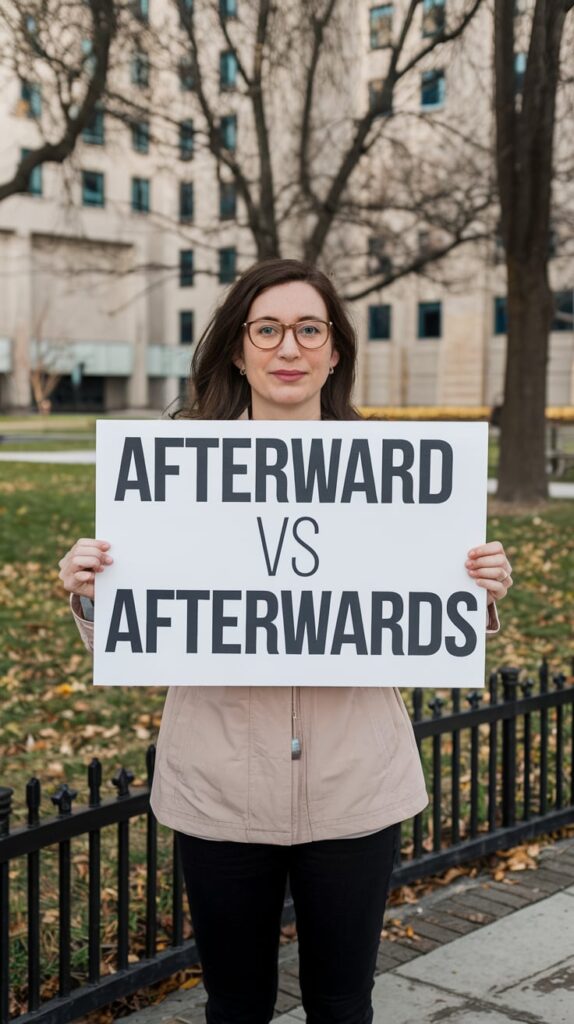Understanding the Difference
When you dive into the nuances of the English language, you often encounter terms that seem nearly identical but carry distinct meanings or usages. A prime example is the ongoing discussion about “afterward” or“afterwards.”
Though they share a similar definition, grasping their differences can elevate your writing and ensure your message is understood clearly. This article will explore the meanings, uses, and contexts of “afterward” vs “afterwards,” along with practical examples, synonyms, and their etymology.
read more : Or vs Nor – Grammar Beacon

What Do ‘Afterward’ and ‘Afterwards’ Mean?
At their core, both “afterward” vs “afterwards” are adverbs that indicate something occurs later in time. They help establish a temporal relationship between events, enabling clearer storytelling and explanations.
Definitions
Afterward: This term is primarily utilized in American English to denote an event that happens later than a specified point in time.
Example: I finished my homework, and afterward, I went for a walk.
Afterwards: This term is more commonly found in British English, carrying the same meaning as “afterward” but aligning with regional preferences.
Example: I finished my homework, and afterwards, I went for a walk.
Understanding these definitions lays the foundation for our exploration of “afterward” vs “afterwards.”
Afterward vs Afterwards: Is There Any Difference?
While both words convey a similar meaning, the key difference lies in regional preference. The choice of which to use often depends on the audience you’re addressing.
read more : Trash vs Garbage – Grammar Beacon

Regional Preferences
American English:
Predominantly uses “afterward.”
British English:
Favors “afterwards.”
Canadian English:
Generally accepts both forms, though usage may vary by region.
This distinction is crucial for writers and speakers aiming for clarity and relevance in their communication.
Why is There Confusion?
The confusion surrounding “afterward” vs “afterwards” often arises from their interchangeable nature. Many individuals might not realize that the preference for one over the other typically depends on geographical location.
For instance, in global contexts, such as in Canadian, Australian, or New Zealand English, both terms are usually acceptable, but regional usage can still influence which one feels more appropriate.
“Afterward” vs “Afterwards”: The Differences
To better understand the distinctions between “afterward” and “afterwards,” let’s break down their usage based on regional preferences, along with illustrative examples.
read more : Simile and Metaphor – Grammar Beacon
Usage Based on Region
When writing for specific audiences, recognizing these preferences is vital:
American English: Use “afterward.”
Example: After the lecture, the students had questions afterward.
British English: Use “afterwards.”
Example: After the lecture, the students had questions afterwards.
Canadian, Australian, and New Zealand English: Both forms are generally acceptable, though regional usage can guide preference.

Examples in Context
To illustrate their usage more clearly, let’s delve into specific examples that demonstrate how “afterward” and “afterwards” can be employed in sentences.
Afterward Examples
- After the meeting concluded, we discussed our plans for the weekend afterward.
- She cooked dinner and afterward served dessert, delighting everyone at the table.
- After finishing his workout, he felt energized and afterward took a refreshing shower.
- He studied late into the night and afterward felt exhausted the next day.
- After the film ended, we went to dinner afterward, sharing our thoughts on the plot.
Afterwards Examples
- We had lunch, and afterwards, we decided to explore the nearby park.
- He completed the book, and afterwards, he shared his thoughts during our discussion.
- They attended the concert, and afterwards, they went out for ice cream to celebrate.
- After finishing her painting, she felt proud of her work and smiled afterwards.
- The team met to discuss the project, and afterwards, they sent a detailed report.
These examples help illustrate how context shapes the choice between “afterward” and “afterwards.”
read more : Pickup or Pick Up – Grammar Beacon
Synonyms and Similar Terms to “Afterward” and “Afterwards”
If you find that neither term fits well in your context, you can consider some synonyms or similar expressions to enhance your writing.
Synonyms for Both “Afterward” and “Afterwards”
Subsequently: This term can be used interchangeably with either word, indicating that something happens later.
Example: He graduated, and subsequently, he found a job.
Later: A straightforward synonym that is often understood and used in casual contexts.
Example: We went to the movies, and later, we had dinner.
Thereafter: This term emphasizes an event occurring after a particular moment, often used in formal writing.
Example: The company launched its new product, and thereafter, sales increased significantly.
Soon after: Another way to express a subsequent action, generally used in less formal contexts.
Example: He finished his report, and soon after, he submitted it for review.
More Specific Alternatives
In the following time: This phrase can clarify the timing of events, although it may sound more formal.
Example: In the following time, we made significant progress on the project.
At a later time: A more formal way of indicating time, often used in business or academic writing.
Example: The meeting will be rescheduled for a later time.
Following that: A flexible phrase that can suit various contexts, often used in narratives.
Example: We finished our work, and following that, we took a break.
Using these alternatives can provide variety and nuance in your writing, ensuring it remains engaging and clear.

Origins of “Afterward” or “Afterwards”
To deepen our understanding of “afterward” vs “afterwards,” it’s enlightening to explore their etymology.
Origins of “Afterward”
The term “afterward” finds its roots in Old English, specifically the word æfterwearde, which translates to “after” or “afterward.” This historical background illustrates how the term has retained its essential meaning through centuries.
The word’s evolution showcases the changes in spelling and pronunciation as the English language developed over time.
read more : Hoodie or Hoody – Grammar Beacon
Origins of “Afterwards”
In contrast, “afterwards” emerged in the early 1300s as a combination of “after” and “ward,” embodying a similar temporal concept.
Its development illustrates the evolution of the English language and reflects how English speakers adapted terms to fit their communication needs.
Both words have experienced a fascinating journey through history, maintaining their core meanings while adapting to the preferences of different English-speaking cultures.
Which One Should You Use: “Afterward” or “Afterwards”?
When faced with the choice between “afterward” or “afterwards,” consider your audience. Making the right choice enhances the clarity and consistency of your writing and resonates more effectively with your readers.
Audience Considerations
For American audiences: Opt for “afterward.”
Example: Afterward, we’ll discuss our findings in more detail.
For British readers: Choose “afterwards.”
Example: Afterwards, we’ll discuss our findings in more detail.
In global contexts: Recognize that both forms are generally acceptable, but regional usage can still guide your choice.
By making informed decisions based on your audience, you can elevate your writing and enhance its effectiveness.
A Final Look at “Afterward or Afterwards”
Understanding the distinctions between “afterward” or “afterwards” can greatly enhance your writing. Both terms serve a similar function in conveying the timing of events, yet knowing your audience can significantly influence your choice.

Key Takeaways
- “Afterward” is predominantly used in American English.
- “Afterwards” is favored in British English.
- Both words convey similar meanings but reflect regional preferences.
By recognizing these differences and making informed choices, you can ensure your writing is both clear and culturally appropriate.
Cultural Context and Usage in Literature
Understanding the cultural context of “afterward” and “afterwards” can further illuminate their differences. In literature, authors often choose one term over the other based on their audience’s expectations.
Usage in American Literature
In American literature, “afterward” frequently appears, reflecting the cultural inclination toward brevity and clarity. For example, a contemporary author might write:
- He completed the race, and afterward, he celebrated with friends.
Usage in British Literature
Conversely, British authors often favor “afterwards,” which can lend a slightly more formal tone to the narrative. An example might be:
- She completed the marathon, and afterwards, she enjoyed a well-deserved rest.
This distinction in literary usage highlights how regional preferences can shape language and influence writing styles.
Practical Tips for Using “Afterward” and “Afterwards”
To navigate the nuances of “afterward” and “afterwards” effectively, consider the following practical tips:
Know Your Audience: Always tailor your language to your audience. Use “afterward” for American readers and “afterwards” for British readers.
**Be-Consistent:** Once you choose a form, stick with it throughout your piece to maintain clarity and avoid confusion.
Consider the Tone: Think about the tone of your writing. If it’s formal, you might prefer “afterwards.” In more casual contexts, “afterward” may feel more appropriate.
Use Synonyms When Needed: If neither term seems to fit, don’t hesitate to use synonyms or phrases that convey the same meaning.
Read Aloud: When in doubt, read your writing aloud. This can help you gauge the flow and decide which term sounds more natural in context.
By applying these tips, you can improve your command of “afterward” vs “afterwards,” ensuring that your writing is both engaging and effective.
Conclusion
Navigating the differences between “afterward” and “afterwards” is essential for effective communication. By understanding the regional preferences, contexts, and subtle distinctions, you can enhance your writing’s clarity and resonance.
Incorporating these insights will allow you to engage your audience more effectively, ensuring that your message is clear and culturally relevant. As you refine your writing skills, keep in mind the importance of word choice and its impact on your audience’s understanding.
With this comprehensive overview of “afterward vs afterwards,” you should now feel equipped to use these terms confidently in your writing. Embrace the differences, and let your words reflect clarity and precision!

James Logan is a seasoned blogger and language enthusiast behind Grammar Beacon. With years of experience in grammar and writing, James shares his expertise through insightful and engaging content. His passion for clear communication and linguistic precision shines in every post, making complex grammar concepts accessible and enjoyable for readers. Follow James for expert advice and tips to refine your writing skills.







